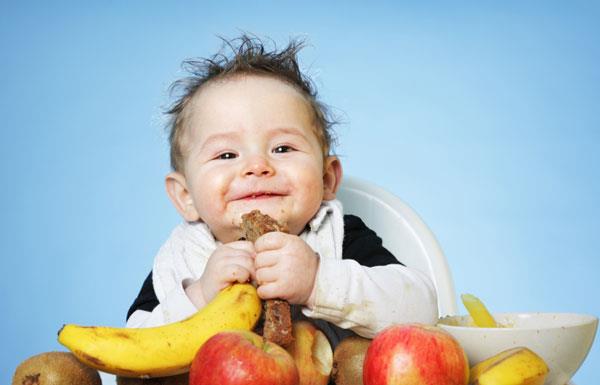Breastfeeding is one of the new developments, not only adding nutrients to the body but also helping to form and develop chewing and swallowing skills for babies. Therefore, the process of practicing solids-feeding is very important, because if not careful, the mother's mistake can adversely affect the baby's development.
1 / Add salt to baby foods
Unlike adults, children under 1 year old do not need additional salt in everyday foods. Even the seasoning, adding salt to baby foods, on the contrary, can seriously affect the baby's health. During this period, the baby only needs 1g of salt / day, and the amount of salt in breast milk and formula milk is enough to satisfy. In addition, during this period, the baby's kidneys are still quite immature, and not strong enough to "carry" the excess salt.
Besides salt, mothers should not add sugar, monosodium glutamate, or seasoning powder to your child's food . Let your baby taste the natural flavors of foods that will help stimulate and develop your baby's taste and taste.

2 / Get the water out of the water
Afraid that your baby will easily choke or choke, not only the bones to get water, many mothers also "carefully" crush vegetables, grind the meat to make porridge for their children in the hope that the baby can absorb all the " quintessence "is distilled in water. However, this is the main reason why your baby cannot absorb minerals and vitamins in food, because contrary to mother's thinking, most of the nutrients are not in water but are "hidden" in the the.
Not as good as thinking of mothers, using bone broth to cook porridge does not help add protein and calcium for the baby, but on the contrary, it will cause indigestion, affecting digestibility due to excess animal fat many in the country.

Most vitamins and minerals are in the "part" that the mother left
3 / Feeding the baby at the wrong time
According to experts, 4-6 months of age is the appropriate time for mothers to start weaning , because at this time, the baby's digestive system is ready to "receive". foods other than milk. However, it is the "standard" theory. Each baby is a separate individual, so the child's development will also be different, some babies eat early, but some babies eat late. So, mothers should not "take care" of the age but "force" children to eat solids. It is advisable to monitor some of your baby's symptoms, to make sure your baby is ready for a new "challenge".

6 signs your baby is ready for solids Usually, when the baby turns 6, he or she will begin to get used to the solids. But if you do not rely on the timeline, where can you base it to determine when to feed your child? Let's go through the signs below!
4 / Everything is pureed
Blending everything before feeding the baby will help reduce the risk of choking, choking but cause the baby to only swallow reflex, ignoring the opportunity to develop chewing ability. At the same time, regularly eating pureed foods will make babies quickly bored because they can only swallow and not feel the taste of the food. Over time, it can lead to anorexia and anorexia in children .
5 / Eating time is too long. How long does
it take your baby to finish a bowl of porridge? If the answer is more than 30 minutes, maybe she should check it again. According to experts, the time for each meal should last for at most 30 minutes, and even if the baby has not eaten much, mothers should also stop feeding the baby. Feeding your baby for too long just makes the food "cool", losing nutrition and making the baby more ill of food. In addition, if the time to eat each meal is too long will shorten the time to the next meal, and by the time it is time to eat, the baby is still too full to continue eating.
>>> See more discussions with related topics:
How to properly feed baby?
How much formula does a 5-month baby need?














